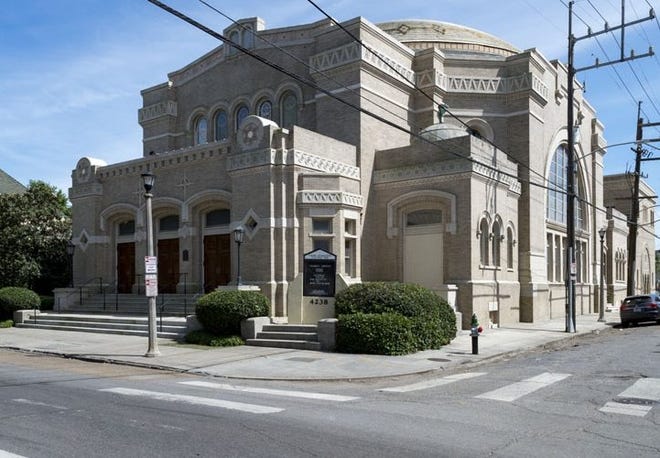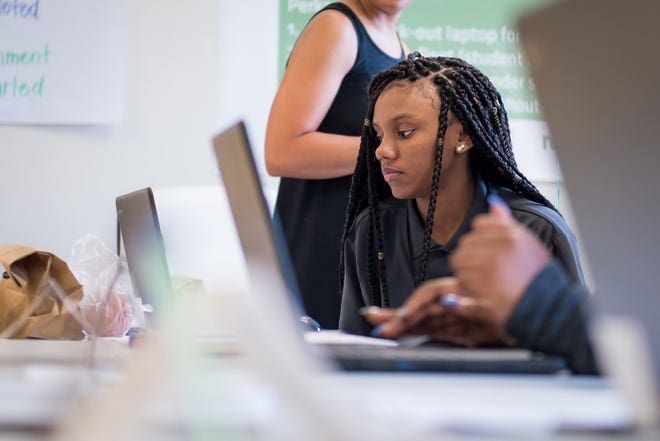A study released this year by UNICEF and the Overseas Development Institute found that high-income countries can see a 5% drop in poverty from universal child benefits.
By: Andrew J. Yawn
Each week, high school senior Joia’ White’s phone pings with a Cash App notification. Her school, The Rooted School in New Orleans, just transferred another $50 to her account.
“I’m like, ‘Okay. $50 more to add to the bank,’” said the 17-year-old.
It’s $50 White wouldn’t have had otherwise. And that’s the point of The Rooted School’s guaranteed income experiment, which will pay 10 seniors $2,600 each over the course of a year.
White is one of the seniors to receive weekly payments, which started last month and continues through October 2021.
When she’s not in school, White earns money scooping frozen dessert at Abbott’s Frozen Custard, a shop in New Orleans’ French Quarter. The extra $50 a week has given White the ability to plan for her future or prepare for the unknown, she said.
“I’ve actually been saving the money since getting it. Just putting it aside for later, for hard times or for college,” White said.

Guaranteed income, the idea of giving out weekly or monthly payments with no strings attached, is an anti-poverty theory being tested across the country.
This summer, mayors in 25 cities joined the Mayors for Guaranteed Income coalition, which hopes to support local pilot programs. Cities such as Jackson, Mississippi, and Stockton, California, already have guaranteed income programs in place and are studying what happens when adults are given a financial safety net.
‘This puts agency in the hands of young people’
The Rooted School’s program, however, is the first of its kind to test what happens when you give high school seniors a weekly stipend.
The program is funded by New Orleans-based education non-profit 4.0 Schools, and the results will be analyzed by Stacia Martin-West, director of the University of Pennsylvania’s Center for Guaranteed Income Research.

“We haven’t targeted a population like this before,” Martin-West said. “I truly don’t know (what the data will show) and that’s very exciting.”
At the outset, Martin-West addressed a skeptic’s likely question about giving money to high school students without stipulations attached. Wouldn’t the average teenager just frivolously spend it?
“The feeling about teenagers is that they’re going to go out and buy an iPhone or AirPods. And certainly I hope for kids that have never had that opportunity, that they do that if it makes them happy. Everyone deserves that,” Martin-West said. “But I think what you’re seeing is probably what we’ll see in a broader narrative, which is kids planning for the future and helping out their families.”
For Jonathan Johnson, founder and CEO of The Rooted School, the idea arose in 2016. At the time, Johnson saw a report that showed the racial wealth gap for New Orleans families. White households earned a median income of $66,000 a year; Black households brought in only $26,000 on average.
In addition, Louisiana currently has the nation’s second-highest child poverty rate (27%) and the highest percentage of families with annual incomes below $10,000, according to an analysis of U.S. Census data by 24/7 Wall St.
For Johnson, who remembers having to move as a child because his family could no longer afford rent in a gentrifying neighborhood, The Rooted School was founded to directly combat those wage gaps.

The school’s curriculum is designed to help students graduate with career-ready skills in high-demand fields such as technology. For example students learn coding, which the schools’ educators believe arm students with a skill to help them earn an income faster.
“We wanted to get creative about how we could do more to advance our kids’ lives faster,” Johnson said. “Our approach was not to have any conditions on the front end of this.
“It was simply to see what happens when you give young people cash for the first time. “This puts agency in the hands of young people.”
‘A guaranteed cushion’
Vernell Cheneau, another student and recipient of the stipend, was inspired to pursue a dream of entrepreneurship. Cheneau grew up watching Shark Tank, the reality TV show where budding business magnates can solicit investment.
He used the first two stipends to buy 55 phone cases and started a cell phone accessory business called Just in Case.
“I took $100 from this program and bought enough product to make a $450 profit from it,” Cheneau said. “It’s huge. It’s a guaranteed cushion of knowing you’ll get that $50 each week to save toward the things that are really important to you.”

The results of the study won’t be ready for analysis until 2022, Martin-West projects. Students including White and Cheneau will complete surveys and answer questions about how the program has affected anxieties, depression or ability to plan for the future. In-person interviews will provide context for how the students’ views of the program have changed over time.
In Jackson and Stockton — which began guaranteed income programs for adults in 2018 — early results show the additional money allowed people to pay bills, save for houses or eat more homecooked meals.
A study released this year by UNICEF and the Overseas Development Institute found that high-income countries such as the U.S. can see a 5% drop in poverty from universal child benefits — payments like the ones White and Cheneau are receiving.
On an individual level, Martin-West said she expects to see positive mental health benefits from the weekly payments.
“I think what it may do is instill in kids a sense of power and autonomy they haven’t had before,” Martin-West said. “There’s something to be said when a program says, ‘We don’t want to know what you do with this money. We totally trust you.’”
White and Cheneau understand they are pioneers — and as Martin-West calls them, research partners — of a policy that can expand to other schools and states.
Cheneau said he’s aware of the stigma guaranteed income carries but is hopeful his school can be the example that can foster more understanding.
“People think teenagers are going to be irresponsible with their money and just blow it,” Cheneau said. “If they see people like me who are using the money to create systems that make more money…I feel like we can break the perception that people will spend this money on the worst things.”
Cheneau hasn’t decided if he will pursue college or work to expand his budding business. White is deciding on colleges, LSU and Cornell, and weighing her interests in graphic design against her lifelong desire to be a veterinarian.
While both seniors face a litany of unknowns between now and what would be the first semester of college, they know that these guaranteed payments will continue until the first month of the semester.
“It helps me accomplish my goals, because it’s a safety net. If I fall short in some way, then I have that to back me up,” White said. “Having this money, I know I can save this, and wherever I go, I’ll have this to help me push forward.”
________________________________________________________
To see original article please visit: https://www.clarionledger.com/story/news/american-south/2020/12/02/guaranteed-income-experiment-underway-new-orleans-high-school-child-poverty/3766870001/
















